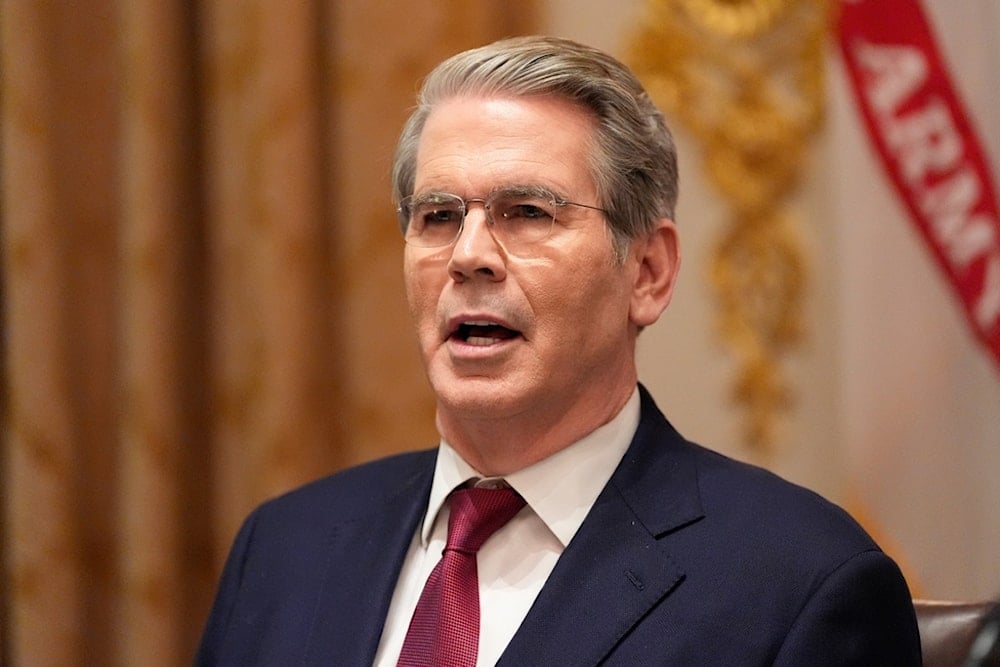US, China to resume trade talks in Malaysia to avert tariff war
US Treasury Secretary Scott Bessent and Chinese Vice Premier He Lifeng will meet in Malaysia next week to prevent an escalation in the trade war.
-

US Treasury Secretary Scott Bessent speaks before a lunch with President Donald Trump and Ukraine's President Volodymyr Zelensky in the Cabinet Room of the White House, Friday, October 17, 2025, in Washington. (AP)
US Treasury Secretary Scott Bessent announced Friday that he will meet Chinese Vice Premier He Lifeng in Malaysia next week in a bid to avert an escalation of tariffs between the world’s two largest economies.
The announcement followed a phone call between the two officials on Friday evening, during which Bessent said they “engaged in frank and detailed discussions regarding trade between the United States and China.” He later confirmed on X that they had agreed to continue discussions in person.
China’s state-run Xinhua News Agency described the conversation as “candid, in-depth, and constructive,” noting both sides agreed to resume a new round of trade talks “as soon as possible.”
Renewed efforts to prevent tariff escalation
The planned Malaysia meeting comes amid mounting friction after Trump threatened to double tariffs on Chinese imports to 100% starting November 1 unless Beijing lifts its new export restrictions on rare-earth minerals and magnets.
When asked by Fox Business Network whether such tariffs were sustainable, Trump admitted, “It’s not sustainable, but that’s what the number is,” adding that Beijing had “forced me to do that.”
The White House has accused China of weaponizing control over rare-earth elements, which are essential to high-tech manufacturing. The new restrictions have alarmed Washington, with Bessent and US Trade Representative Jamieson Greer calling them a “direct threat to global supply chains.”
The upcoming meeting in Malaysia would mark a shift from previous discussions, which took place in several European cities over the past six months and produced a temporary tariff truce set to expire on November 10.
Global markets react to softer tone
Trump also confirmed plans to meet Chinese President Xi Jinping in South Korea in two weeks, signaling a possible thaw in tone after weeks of combative rhetoric. “I think we're going to be fine with China, but we have to have a fair deal. It's got to be fair,” Trump said.
His remarks helped stabilize US markets, which had been rattled by renewed tariff fears and banking sector concerns. Wall Street indexes rebounded on Friday afternoon after the announcement of the Bessent–He meeting.
World Trade Organization Director-General Ngozi Okonjo-Iweala urged both nations to de-escalate their trade dispute, warning that a prolonged standoff could cut global output by up to 7% in the long term. “The WTO is extremely concerned about the latest spike in US-China trade tensions,” she told Reuters.
Meanwhile, Bessent criticized China’s “state-driven economic practices” in a statement to the IMF’s steering committee, calling for tougher scrutiny of Beijing’s industrial policies and trade imbalances.
China’s Commerce Ministry responded by accusing Washington of undermining global trade rules since Trump took office, vowing to intensify dispute cases at the WTO and urging the US to “align its industrial and security policies with multilateral obligations.”
US and China enter shipping standoff
Trade tensions between Washington and Beijing have deepened as both nations started charging new port fees on each other's ships beginning on October 14, which widens their economic conflict beyond goods and into global maritime trade.
Beijing said its new fees are a countermeasure to US policies and will apply to US-owned, operated, built, or registered vessels, but not to ships built in China, mirroring new US port charges that Washington says are meant to support its domestic shipping industry, which has struggled to compete with Asia's subsidized shipyards.
Chinese state media said the US fees break a bilateral maritime agreement from over twenty years ago, and in response, Beijing will charge 400 yuan per net tonne on ships linked to the US, a rate that will increase each year to 1,120 yuan per tonne by April 2028.

 4 Min Read
4 Min Read








